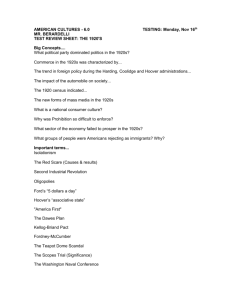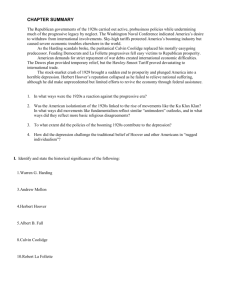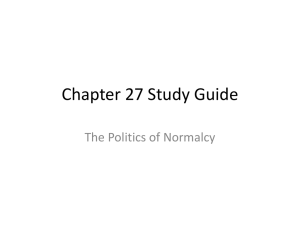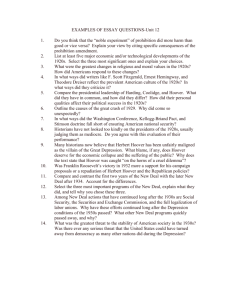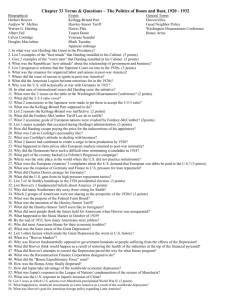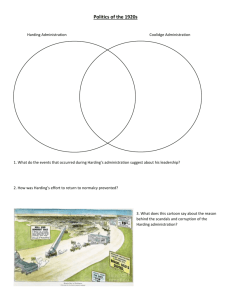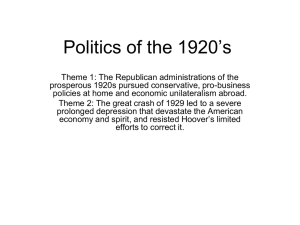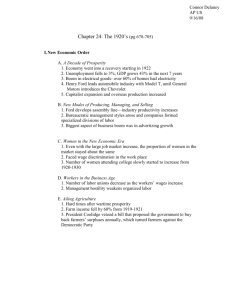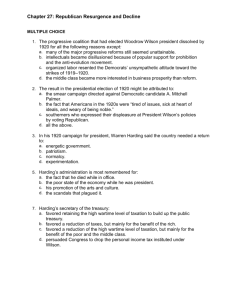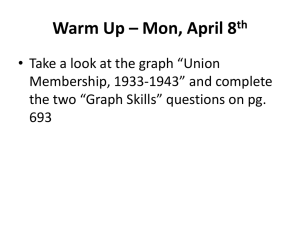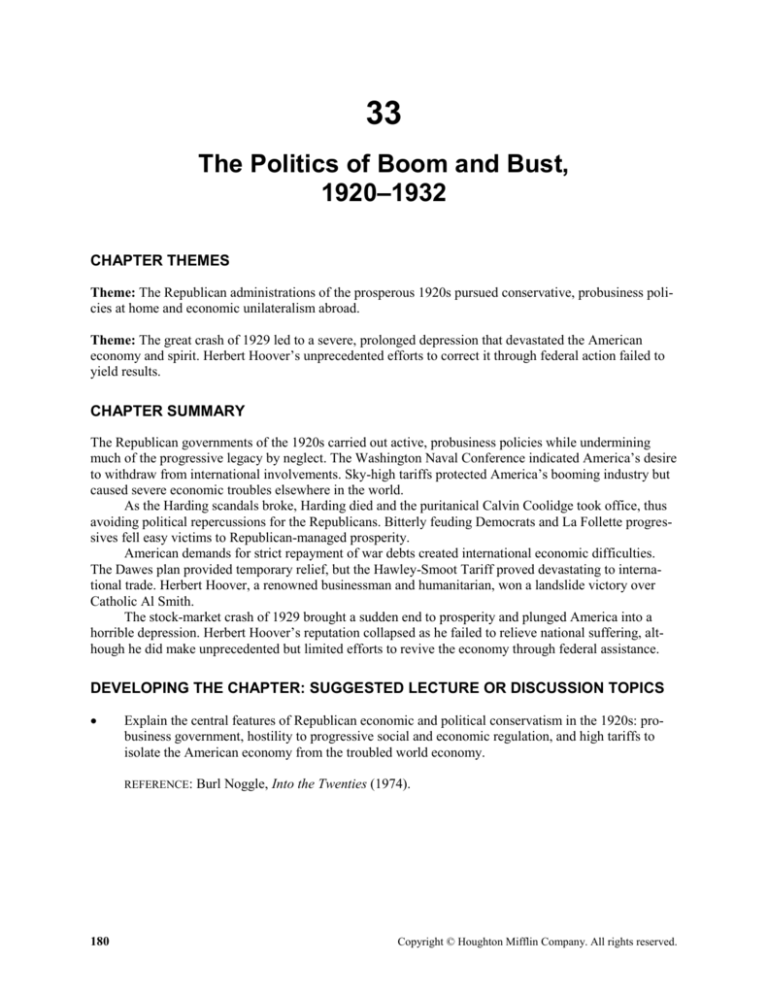
33
The Politics of Boom and Bust,
1920–1932
CHAPTER THEMES
Theme: The Republican administrations of the prosperous 1920s pursued conservative, probusiness policies at home and economic unilateralism abroad.
Theme: The great crash of 1929 led to a severe, prolonged depression that devastated the American
economy and spirit. Herbert Hoover’s unprecedented efforts to correct it through federal action failed to
yield results.
CHAPTER SUMMARY
The Republican governments of the 1920s carried out active, probusiness policies while undermining
much of the progressive legacy by neglect. The Washington Naval Conference indicated America’s desire
to withdraw from international involvements. Sky-high tariffs protected America’s booming industry but
caused severe economic troubles elsewhere in the world.
As the Harding scandals broke, Harding died and the puritanical Calvin Coolidge took office, thus
avoiding political repercussions for the Republicans. Bitterly feuding Democrats and La Follette progressives fell easy victims to Republican-managed prosperity.
American demands for strict repayment of war debts created international economic difficulties.
The Dawes plan provided temporary relief, but the Hawley-Smoot Tariff proved devastating to international trade. Herbert Hoover, a renowned businessman and humanitarian, won a landslide victory over
Catholic Al Smith.
The stock-market crash of 1929 brought a sudden end to prosperity and plunged America into a
horrible depression. Herbert Hoover’s reputation collapsed as he failed to relieve national suffering, although he did make unprecedented but limited efforts to revive the economy through federal assistance.
DEVELOPING THE CHAPTER: SUGGESTED LECTURE OR DISCUSSION TOPICS
Explain the central features of Republican economic and political conservatism in the 1920s: probusiness government, hostility to progressive social and economic regulation, and high tariffs to
isolate the American economy from the troubled world economy.
REFERENCE:
180
Burl Noggle, Into the Twenties (1974).
Copyright © Houghton Mifflin Company. All rights reserved.
The Politics of Boom and Bust, 1920–1932
181
Contrast Warren Harding and his corrupt cronies with the upright Coolidge and Hoover. Perhaps
show how each of the three presidents represented a different emphasis within the general political
consensus of the probusiness 1920s.
REFERENCES: John D.
Hicks, Republican Ascendancy, 1921–1933 (1960); Joan Hoff Wilson, Herbert Hoover, Forgotten Progressive (1975).
Describe the stock-market crash and the depression. Examine various causes of the depression and
indicate its paralyzing effect on ordinary citizens as well as on the business and political leadership.
REFERENCE:
Robert McElvaine, The Great Depression (1984).
Consider the changing role of American workers in both the probusiness 1920s and during the early
years of the Great Depression.
REFERENCE:
Robert Zieger, American Workers, American Unions, 1920–1985 (1986).
FOR FURTHER INTEREST: ADDITIONAL CLASS TOPICS
Compare the Teapot Dome scandal with other major scandals in American history, e.g., those of the
Grant administration or Watergate.
Discuss the futile Democratic and progressive efforts of the 1920s. The focus might be on the deep
cultural divisions within the Democratic party between urban immigrants and the rural South, epitomized in the 103-ballot Democratic convention of 1924.
Examine Hoover’s career, from humane administrator to business organizer to hapless president.
Discuss why someone so successful proved so helpless in the face of the depression.
Analyze the human consequences of the depression for both the unemployed and the many others
who feared unemployment and found their living standard severely reduced.
CHARACTER SKETCHES
Warren G. Harding (1865–1923)
This simple, genial president was deeply mourned when he died in 1923, just before the news broke of the
thoroughgoing corruption in his administration.
Rumors throughout Harding’s career that he was part black were based only on hometown gossip
and the fact that one of his great-grandparents had lived in a black neighborhood. There is no historical
evidence that he had any black ancestors.
Harding was happy as a small-town editor and poker-playing U.S. senator, although his ambitious
wife, “The Duchess,” constantly pushed him to do greater things. Harding maintained several mistresses,
and one of them—Nan Britton of Marion, Ohio—bore a child by him in 1919. As president, he would
frequently sneak away to play poker with the “Ohio gang” at “the little green house on K street.”
Harding was deeply distressed as he learned of his cronies’ corrupt dealings. He seemed near collapse during his presidential trip to Alaska, on which he died, and frequently asked Secretary of Commerce Herbert Hoover what a president should do if there was dishonesty around him.
Copyright © Houghton Mifflin Company. All rights reserved.
182
Chapter 33
Quote: “My God, this is a hell of a job. I have no troubles with my enemies…but my God-damn
friends!…” (1923)
REFERENCE:
Robert K. Murray, The Harding Era (1969); Eugene P. Trani, The Presidency of Warren G.
Harding (1977).
Calvin Coolidge (1872–1933)
Coolidge’s rectitude and old-fashioned virtues provided welcome relief from the Harding scandals, while
also offering the public a reassuring counterpoint to the wild cultural changes of the 1920s.
At Amherst College, Coolidge astounded classmates by constantly seeking ways to live more
cheaply. He was personally kind and generous, but he was frequently moody and had few close friends.
Even after he became a successful attorney, he used a party-line phone and refused to buy a car because it
was too expensive.
Coolidge was generally ignorant of history and political theory, but he loved classical languages
and sometimes translated Latin literary works into English. He had a malicious sense of humor and loved
to play practical jokes like ringing for White House servants and then hiding from them. His poker-faced
silence was the subject of much commentary and humor. When writer Dorothy Parker was told that Coolidge had died, she said, “How could they tell?”
Quote: “There are two ways to be self-respecting: to spend less than you make, and to make more than
you spend.” (1925)
REFERENCE:
Hendrik Booraem, The Provincial: Calvin Coolidge and His World (1994); Robert Ferrell,
The Presidency of Calvin Coolidge (1998).
Herbert Hoover (1874–1964)
Hoover was an international hero as food relief administrator during World War I and a popular secretary
of commerce, but his single term as president made him a permanent symbol of economic and political
disaster.
Hoover was the product of a strong Iowa Quaker background. His parents died before he was ten,
and he was then raised by an uncle in Oregon. After graduating from Stanford, he lived outside the United
States for nearly twenty years while working as an engineer and businessman. One of his interests was the
history of mining, and he collected and had translated Renaissance classics on the subject.
As a public official, Hoover developed a large staff of deferential subordinates who called him
“The Chief” and generated favorable publicity on his behalf. He was stiff, formal, humorless, and unyielding in his opinions once he had taken a stand. Those who worked intimately with him always liked
him, but he was comfortable only in the company of people who he knew were on his side.
Quote: “We in America today are nearer to the final triumph over poverty than ever before in the history
of any land.…We have not yet reached the goal, but given a chance to go forward with the policies of the
last eight years, we shall soon with the help of God be in sight of the day when poverty will be banished
from this nation.” (Convention acceptance speech, 1928)
REFERENCE: Joan
Hoff Wilson, Herbert Hoover: Forgotten Progressive (1975).
Copyright © Houghton Mifflin Company. All rights reserved.
The Politics of Boom and Bust, 1920–1932
183
QUESTIONS FOR CLASS DISCUSSION
1. In what ways were the 1920s a reaction against the progressive era?
2. Was the American isolationism of the 1920s linked to the rise of movements like the Ku Klux Klan?
In what ways did movements like fundamentalism reflect similar “antimodern” outlooks, and in what
ways did they reflect more basic religious disagreements?
3. To what extent did the policies of the booming 1920s contribute to the depression?
4. How did the depression challenge the traditional belief of Hoover and other Americans in “rugged
individualism”?
Copyright © Houghton Mifflin Company. All rights reserved.

